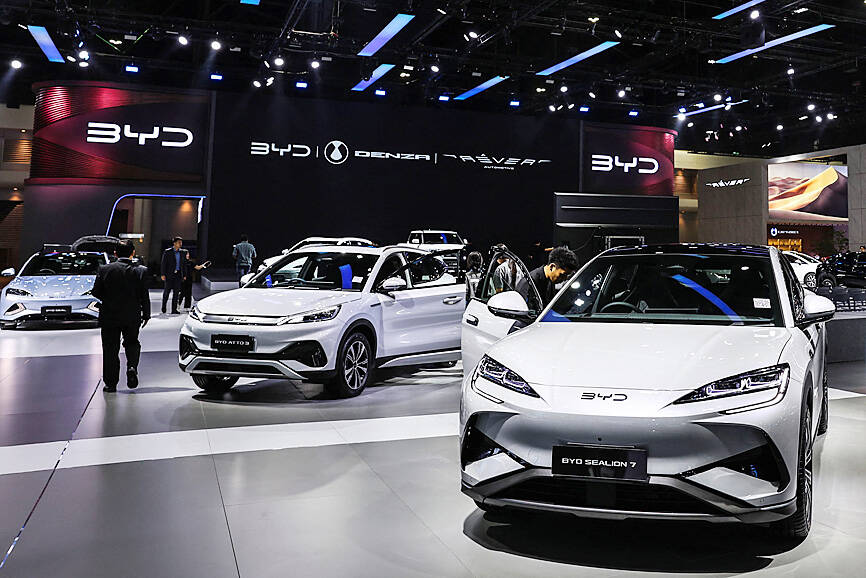BYD Co’s (比亞迪) sales last year surpassed the US$100 billion mark, leapfrogging Elon Musk’s Tesla Inc on revenue, as the Chinese auto giant wows consumers with a range of electric and hybrid cars packed with high-tech features.
Shenzhen-based BYD reported revenue of 777 billion yuan (US$107 billion) for the 12 months ended on Dec. 31, up 29 percent, according to a filing late on Monday, beating estimates for 766 billion yuan. Tesla’s revenue last year was US$97.7 billion. The Chinese company’s net income rose 34 percent year-on-year to 40.3 billion yuan, beating analyst estimates for 39.5 billion yuan.
BYD has risen quickly to the top of China’s car market — the world’s biggest and most competitive in terms of electric vehicles (EVs). This year alone, BYD has unveiled a new ecosystem that allows EVs to charge for 400 kilometers in just five minutes and introduced advanced driver assistance technology in even its most basic models. Investors have sent its shares to a record and BYD’s Hong Kong-listed stock is up around 51 percent this year.

Photo: Chalinee Thirasupa, Reuters
BYD also sells about the same number of EVs as Tesla — 1.76 million units last year versus 1.79 million units — but, when all of its other passenger hybrid car sales are included, it’s much larger. BYD’s total deliveries last year climbed to 4.27 million units, almost as much as Ford Motor Co.
BYD has forecast it can sell between 5 million to 6 million vehicles this year. It’s already off to a strong start, with sales in the first two months of this year up 93 percent year-on-year to 623,300 units.
However, one area where Tesla still clearly leads is market valuation. The US carmaker is worth about US$800 billion despite a share-price rout that has seen the stock plunge 38 percent this year. BYD has a market capitalization closer to US$157 billion.
Musk’s EV maker also makes more money on an absolute basis; Tesla’s net income last year was US$7.6 billion.
But whereas Tesla is losing in China — shipments have been backsliding there for the past five consecutive months on a year-on-year basis — BYD is winning. China is still far and away BYD’s biggest market, where it commands a share of almost 15 percent, not just for new-energy vehicles but any sort of passenger car.
BYD doesn’t sell passenger cars in the US yet due to punitive tariffs on made-in-China automobiles, but it has made big inroads into markets in Europe, places in Asia like Singapore and Thailand, as well as Australia.
BYD chairman and founder Wang Chuanfu (王傳福) said in a statement the company planned to keep boosting research and development while bolstering its product competitiveness, including in its focus of succeeding outside of China.
He also said that Chinese auto brands in the era of intelligence-led vehicles were no longer merely followers, but rather at the forefront of the trend. They’re “daring” to be first in the world and are collaborating with other domestic brands to go global and move up the value chain, he said.

TAKING STOCK: A Taiwanese cookware firm in Vietnam urged customers to assess inventory or place orders early so shipments can reach the US while tariffs are paused Taiwanese businesses in Vietnam are exploring alternatives after the White House imposed a 46 percent import duty on Vietnamese goods, following US President Donald Trump’s announcement of “reciprocal” tariffs on the US’ trading partners. Lo Shih-liang (羅世良), chairman of Brico Industry Co (裕茂工業), a Taiwanese company that manufactures cast iron cookware and stove components in Vietnam, said that more than 40 percent of his business was tied to the US market, describing the constant US policy shifts as an emotional roller coaster. “I work during the day and stay up all night watching the news. I’ve been following US news until 3am

UNCERTAINTY: Innolux activated a stringent supply chain management mechanism, as it did during the COVID-19 pandemic, to ensure optimal inventory levels for customers Flat-panel display makers AUO Corp (友達) and Innolux Corp (群創) yesterday said that about 12 to 20 percent of their display business is at risk of potential US tariffs and that they would relocate production or shipment destinations to mitigate the levies’ effects. US tariffs would have a direct impact of US$200 million on AUO’s revenue, company chairman Paul Peng (彭雙浪) told reporters on the sidelines of the Touch Taiwan trade show in Taipei yesterday. That would make up about 12 percent of the company’s overall revenue. To cope with the tariff uncertainty, AUO plans to allocate its production to manufacturing facilities in

Six years ago, LVMH’s billionaire CEO Bernard Arnault and US President Donald Trump cut the blue ribbon on a factory in rural Texas that would make designer handbags for Louis Vuitton, one of the world’s best-known luxury brands. However, since the high-profile opening, the factory has faced a host of problems limiting production, 11 former Louis Vuitton employees said. The site has consistently ranked among the worst-performing for Louis Vuitton globally, “significantly” underperforming other facilities, said three former Louis Vuitton workers and a senior industry source, who cited internal rankings shared with staff. The plant’s problems — which have not

COLLABORATION: Given Taiwan’s key position in global supply chains, the US firm is discussing strategies with local partners and clients to deal with global uncertainties Advanced Micro Devices Inc (AMD) yesterday said it is meeting with local ecosystem partners, including Taiwan Semiconductor Manufacturing Co (TSMC, 台積電), to discuss strategies, including long-term manufacturing, to navigate uncertainties such as US tariffs, as Taiwan occupies an important position in global supply chains. AMD chief executive officer Lisa Su (蘇姿丰) told reporters that Taiwan is an important part of the chip designer’s ecosystem and she is discussing with partners and customers in Taiwan to forge strong collaborations on different areas during this critical period. AMD has just become the first artificial-intelligence (AI) server chip customer of TSMC to utilize its advanced